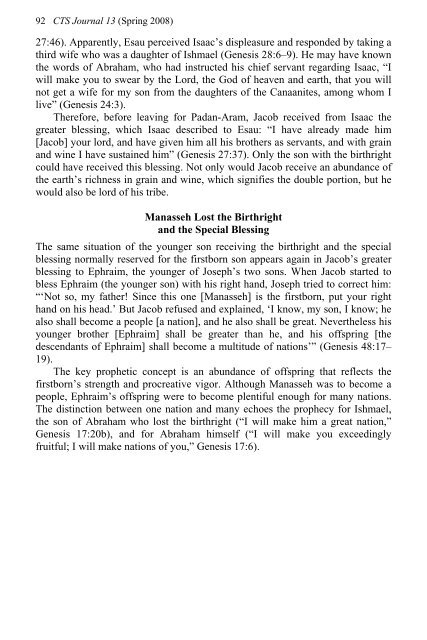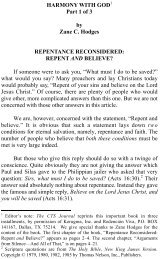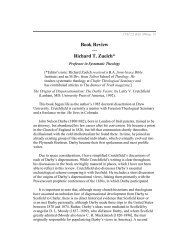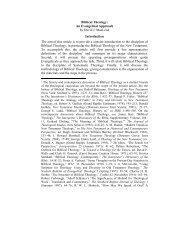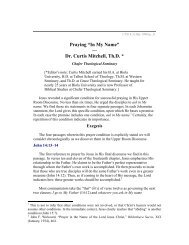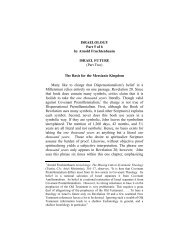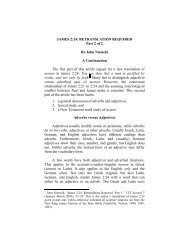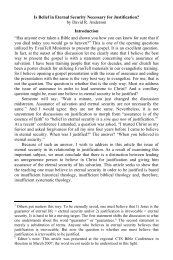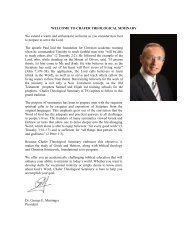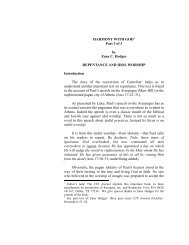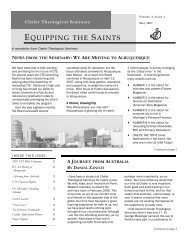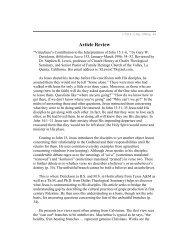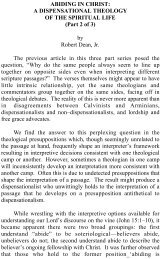Israel's Inheritance: Birthright of the Firstborn Son - Chafer ...
Israel's Inheritance: Birthright of the Firstborn Son - Chafer ...
Israel's Inheritance: Birthright of the Firstborn Son - Chafer ...
Create successful ePaper yourself
Turn your PDF publications into a flip-book with our unique Google optimized e-Paper software.
92 CTS Journal 13 (Spring 2008)<br />
27:46). Apparently, Esau perceived Isaac’s displeasure and responded by taking a<br />
third wife who was a daughter <strong>of</strong> Ishmael (Genesis 28:6–9). He may have known<br />
<strong>the</strong> words <strong>of</strong> Abraham, who had instructed his chief servant regarding Isaac, “I<br />
will make you to swear by <strong>the</strong> Lord, <strong>the</strong> God <strong>of</strong> heaven and earth, that you will<br />
not get a wife for my son from <strong>the</strong> daughters <strong>of</strong> <strong>the</strong> Canaanites, among whom I<br />
live” (Genesis 24:3).<br />
Therefore, before leaving for Padan-Aram, Jacob received from Isaac <strong>the</strong><br />
greater blessing, which Isaac described to Esau: “I have already made him<br />
[Jacob] your lord, and have given him all his bro<strong>the</strong>rs as servants, and with grain<br />
and wine I have sustained him” (Genesis 27:37). Only <strong>the</strong> son with <strong>the</strong> birthright<br />
could have received this blessing. Not only would Jacob receive an abundance <strong>of</strong><br />
<strong>the</strong> earth’s richness in grain and wine, which signifies <strong>the</strong> double portion, but he<br />
would also be lord <strong>of</strong> his tribe.<br />
Manasseh Lost <strong>the</strong> <strong>Birthright</strong><br />
and <strong>the</strong> Special Blessing<br />
The same situation <strong>of</strong> <strong>the</strong> younger son receiving <strong>the</strong> birthright and <strong>the</strong> special<br />
blessing normally reserved for <strong>the</strong> firstborn son appears again in Jacob’s greater<br />
blessing to Ephraim, <strong>the</strong> younger <strong>of</strong> Joseph’s two sons. When Jacob started to<br />
bless Ephraim (<strong>the</strong> younger son) with his right hand, Joseph tried to correct him:<br />
“‘Not so, my fa<strong>the</strong>r! Since this one [Manasseh] is <strong>the</strong> firstborn, put your right<br />
hand on his head.’ But Jacob refused and explained, ‘I know, my son, I know; he<br />
also shall become a people [a nation], and he also shall be great. Never<strong>the</strong>less his<br />
younger bro<strong>the</strong>r [Ephraim] shall be greater than he, and his <strong>of</strong>fspring [<strong>the</strong><br />
descendants <strong>of</strong> Ephraim] shall become a multitude <strong>of</strong> nations’” (Genesis 48:17–<br />
19).<br />
The key prophetic concept is an abundance <strong>of</strong> <strong>of</strong>fspring that reflects <strong>the</strong><br />
firstborn’s strength and procreative vigor. Although Manasseh was to become a<br />
people, Ephraim’s <strong>of</strong>fspring were to become plentiful enough for many nations.<br />
The distinction between one nation and many echoes <strong>the</strong> prophecy for Ishmael,<br />
<strong>the</strong> son <strong>of</strong> Abraham who lost <strong>the</strong> birthright (“I will make him a great nation,”<br />
Genesis 17:20b), and for Abraham himself (“I will make you exceedingly<br />
fruitful; I will make nations <strong>of</strong> you,” Genesis 17:6).


